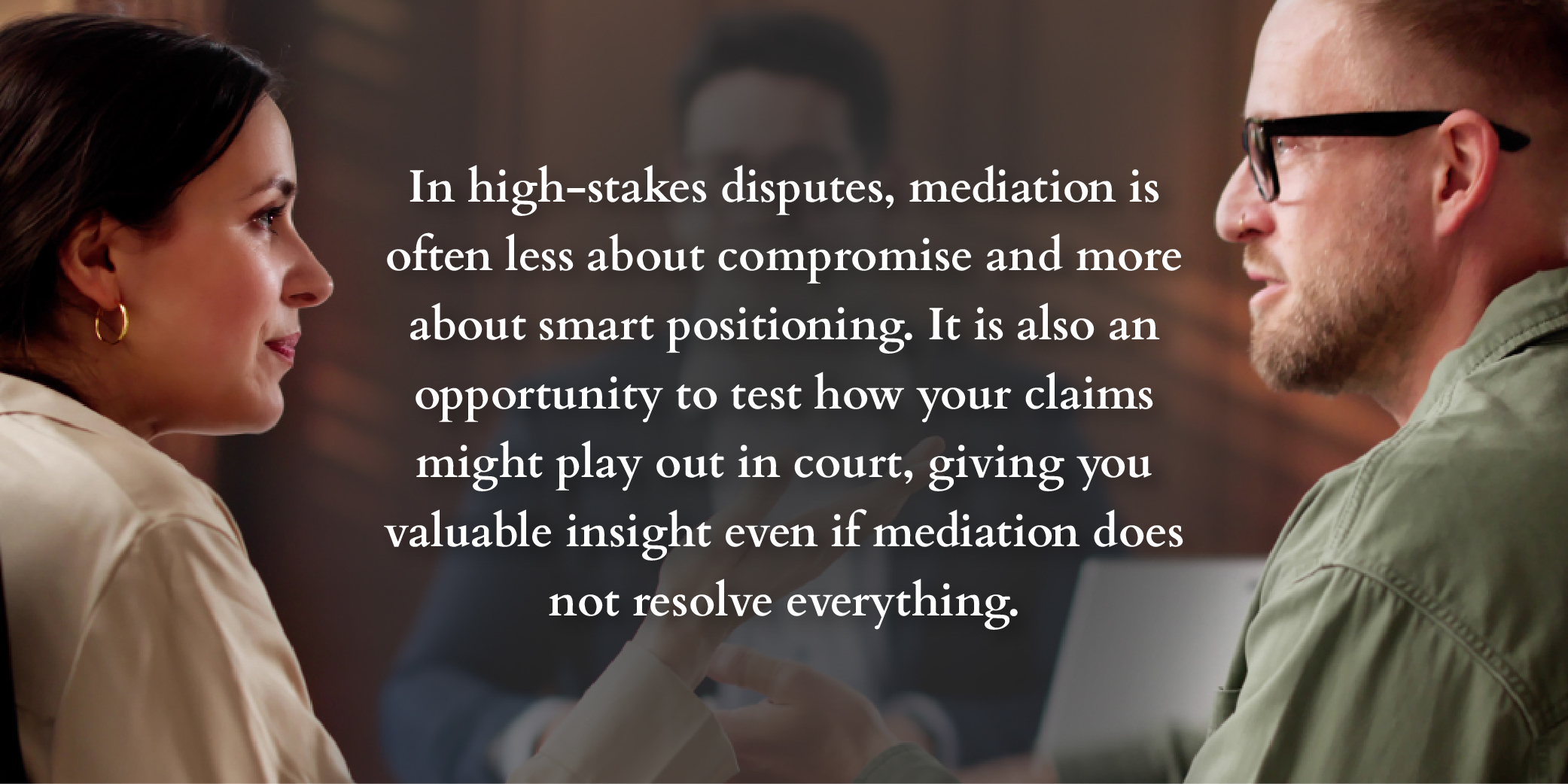What is the Role of Mediation in Illinois Commercial Litigation?

Business disputes can escalate quickly, with millions of dollars at stake. In Illinois, particularly in high-stakes commercial litigation involving closely held companies, partnerships, or family-owned enterprises, traditional litigation is not always the best first step. Mediation has become a powerful tool to resolve complex business conflicts more efficiently and with more control.
Understanding how mediation fits into Illinois commercial litigation can be the difference between preserving a business and watching it unravel in court. Mediation is not just a procedural requirement; it is often a major strategic advantage, especially when backed up by an experienced Naperville, IL business law attorney.
How Does Mediation Work in the Context of Commercial Disputes?
Mediation is a form of alternative dispute resolution (ADR) that involves a neutral third party who helps both sides try to reach a voluntary settlement. Unlike a judge or arbitrator, the mediator does not impose a decision. Instead, the mediator facilitates negotiation, helps parties clarify their interests, and identifies possible compromises.
In Illinois, mediation may be court-ordered or voluntarily initiated. Many state and federal courts encourage mediation early in the litigation process to avoid unnecessary trials, reduce costs, and preserve business relationships.
In commercial cases, mediation can address disputes such as:
- Breach of contract
- Shareholder or partnership disagreements
- Employment and executive compensation conflicts
- Real estate and construction issues
- Business torts like fraud, misrepresentation, or interference
- Non-compete and trade secret violations
- Buy-sell agreement enforcement
Why Choose Mediation Over Litigation for a Business Dispute?
Commercial litigation is expensive, time-consuming, and public. It often involves extensive discovery, expert witnesses, and unpredictable outcomes. By contrast, mediation offers business owners several advantages:
Privacy
Mediation proceedings are confidential, allowing businesses to keep sensitive financial and reputational information out of the public record. For high net worth families or public-facing individuals, this can be essential for protecting long-term business viability and personal privacy.
Control
The parties retain control over the outcome. There is no judge making a binding ruling, only a settlement both parties agree to. This allows for more creative solutions than a court might impose.
Speed
A dispute that could take years to resolve in court may be mediated in a matter of weeks or months. This can be especially beneficial when the dispute risks interrupting operations or damaging valuable partnerships.
Cost Savings
While mediation still requires preparation, the overall legal fees and expert costs are generally lower than full-scale litigation. Even partial resolution of issues can reduce the scope of the trial and result in significant savings.
Preserving Relationships
In family-run businesses, joint ventures, or long-standing commercial relationships, the goal is often to find a workable solution, not destroy the relationship. Mediation helps preserve goodwill and professional respect.
When Is Mediation Used in Illinois Business Litigation?
Mediation may be proposed before a lawsuit is even filed. In many cases, a demand letter triggers discussions between legal counsel, and parties may agree to mediate before costs escalate. Alternatively, mediation may occur during discovery or pretrial motions, or even on the eve of trial.
In Illinois Circuit Courts, judges often recommend or require mediation. In federal commercial cases, mediation may be conducted under local court rules or through private services.
It is also common for operating agreements, partnership contracts, or business formation documents to include clauses dictating mandatory mediation before litigation can proceed. If your agreements include ADR provisions, you may be legally obligated to mediate before you can file suit.

How Does the Mediation Process Work for Business Disagreements?
While every mediation is different, most follow a similar structure. The parties select a mediator, often someone with extensive experience in commercial law or a retired judge. The mediation may take place in person or remotely, depending on the parties’ preference and the complexity of the issues.
Here is how a typical process unfolds:
- Preparation: Each party prepares a confidential statement for the mediator outlining the facts, legal issues, and goals. Your attorney may submit relevant documents, financial data, or expert opinions.
- Opening Session: The mediator sets ground rules and gives each side an opportunity to explain their position. This may occur with both parties present or in separate sessions (called caucuses).
- Private Negotiations: The mediator meets privately with each side, exploring concerns, uncovering interests, and offering perspective on risks. This back-and-forth continues as the mediator works to move both sides toward compromise.
- Resolution or Impasse: If agreement is reached, the attorneys draft a binding settlement agreement or term sheet. If no agreement is reached, the litigation continues, but the process may have clarified the key issues or narrowed the scope of the dispute.
Can Mediation Resolve an Entire Business Dispute?
In many cases, a full settlement can be reached through mediation. But even when mediation does not resolve every issue, it often helps parties make progress. For example, a mediation may resolve certain financial claims while leaving valuation or contract interpretation for the court. Or it may result in a payment plan, asset transfer, or buyout agreement that would not have been available through a traditional verdict.
For clients with complex holdings like real estate, equity in multiple businesses, or multigenerational ownership structures, mediation allows for tailored solutions that honor the long-term vision of the business, not just the short-term dispute.
What Role Does an Attorney Play in Commercial Mediation?
In high-stakes disputes, mediation is often less about compromise and more about smart positioning. It is also an opportunity to test how your claims and defenses may play out in court, giving you valuable insight even if mediation does not resolve everything.
While mediation is useful in most commercial cases, there are situations where it may not be effective. For example, mediation may be less productive if one party is not negotiating in good faith. Likewise, if one party needs emergency relief through an injunction, such relief cannot be sought through mediation. Finally, if there are criminal allegations or serious regulatory violations, a case will need to be litigated in court.
That said, even in contentious situations, skilled counsel and a qualified mediator can often create a process that levels the playing field and guides parties toward resolution.
Contact a Naperville, IL Business Lawyer
If you are facing a business dispute or expect one to come up, speak with a Naperville, IL commercial litigation attorney at Gierach Law Firm about whether mediation could serve your goals. Our firm works with high net worth clients and complex business structures with skill and discretion. Call 630-756-1160 to schedule a confidential consultation.
Practice Areas
Archive
+2018
+2016
Please note: These blogs have been created over a period of time and laws and information can change. For the most current information on a topic you are interested in please seek proper legal counsel.














